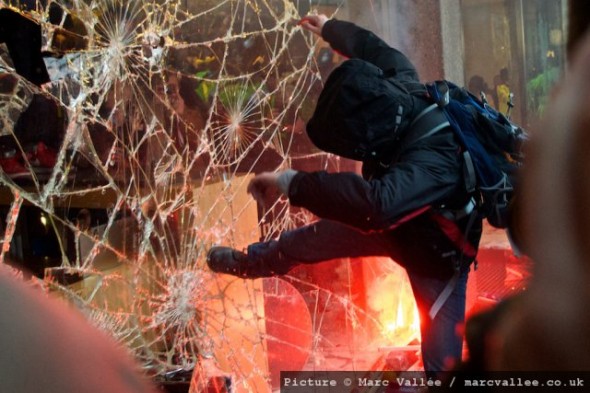Clik here to view.

LONDON, UNITED KINGDOM – 10.11.10. Student protesters and police clash outside the Conservative Party headquarters at Millbank in central London on Wednesday 10th November 2010. Early in the day 50,000 students and supporters marched against the governments plans to rises tuition fees to £9,000 per year. (Photo by Marc Vallée/marcvallee.co.uk) © Marc Vallée, 2010. All rights reserved.
A journalist protects the identity of sources who supply information in confidence and material gathered in the course of her/his work
Last week many NUJ members reported on the events outside the Conservative Party headquarters at Millbank in central London. The clashes between police and student protesters was of great public interest. Many frontline journalists, at great personal risk, gathered news content for the purpose and informing the wider public of the events of the day.
The police have started their criminal investigation, for many hours the police did not have police photographers or evidence gatherers at the scene. It is likely that the police will turn to photographers, journalists and media groups for material that was gathered.
It is a fundamental journalistic principle not to hand over material, to the state or elsewhere. It is not the role of journalists to collect material for the Police.
As Tim Gopsill and Greg Neale wrote in, Journalists – 100 Years of the NUJ “On a practical and important level, if angry crowds get the idea that journalists are going to hand over pictures to the police they are likely to turn on them.”
A journalist is entitled not to voluntarily hand over material that the police request and can require the police to seek a Court Order from a judge. A journalist can then make representations to the Judge if they wish. This applies both under the Police & Criminal Evidence Act (PACE) and counter-terrorism legislation. The European Convention on Human Rights, Article 10, Freedom of Expression may be engaged, in relation to confidentiality of sources and material, and also Article 2, Right to Life, as to the safety of journalists.
If you are approached by the police for your material you should contact the NUJ before you do anything. If you are a member, during office hours you can contact the NUJ Legal Department on 020 7843 3721. If you urgently need help you call the 24hr NUJ emergency legal helpline on 0800 5877530.
We will get you legal advice and support in dealing with the police request.
